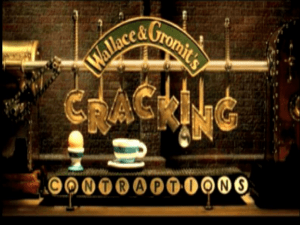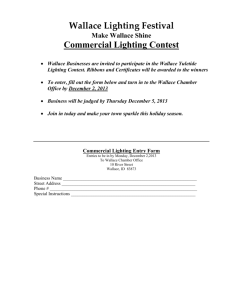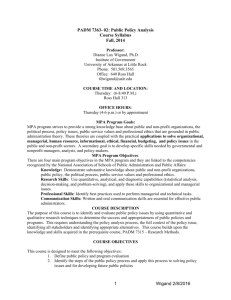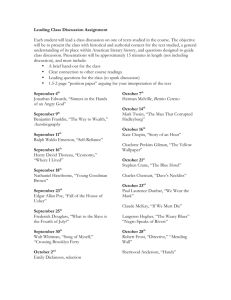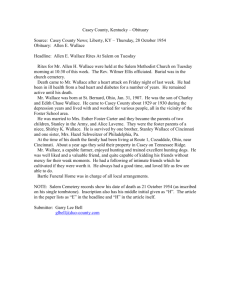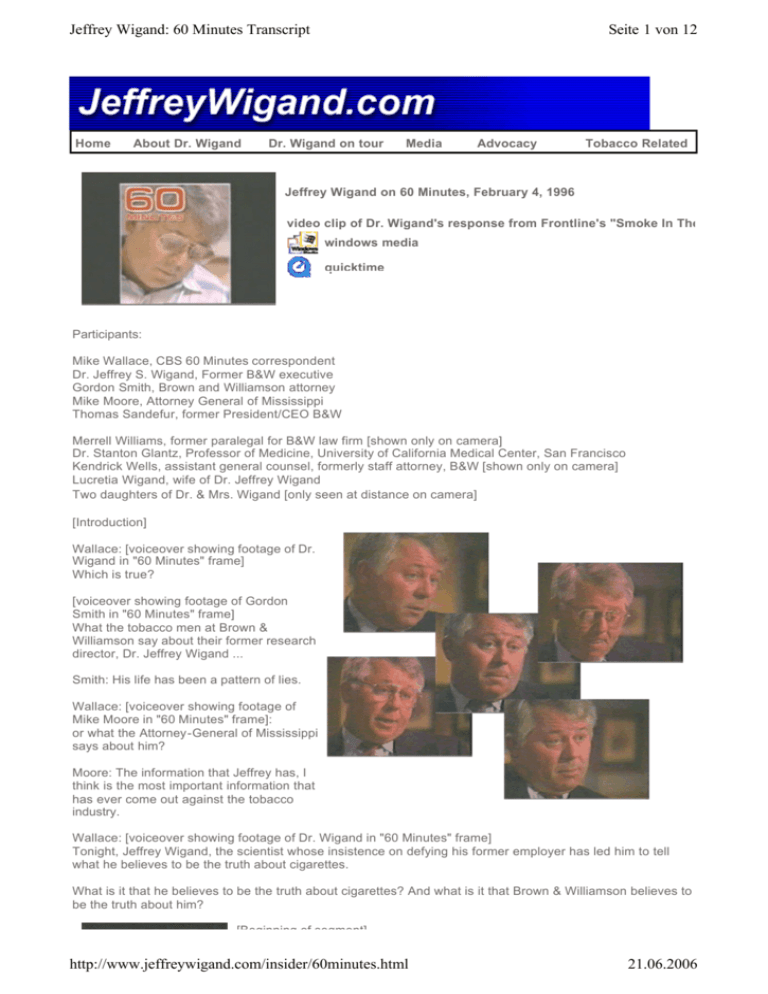
Jeffrey Wigand: 60 Minutes Transcript
Home
About Dr. Wigand
Seite 1 von 12
Dr. Wigand on tour
Media
Advocacy
Tobacco Related
Jeffrey Wigand on 60 Minutes, February 4, 1996
video clip of Dr. Wigand's response from Frontline's "Smoke In The Eye"
windows media
quicktime
Participants:
Mike Wallace, CBS 60 Minutes correspondent
Dr. Jeffrey S. Wigand, Former B&W executive
Gordon Smith, Brown and Williamson attorney
Mike Moore, Attorney General of Mississippi
Thomas Sandefur, former President/CEO B&W
Merrell Williams, former paralegal for B&W law firm [shown only on camera]
Dr. Stanton Glantz, Professor of Medicine, University of California Medical Center, San Francisco
Kendrick Wells, assistant general counsel, formerly staff attorney, B&W [shown only on camera]
Lucretia Wigand, wife of Dr. Jeffrey Wigand
Two daughters of Dr. & Mrs. Wigand [only seen at distance on camera]
[Introduction]
Wallace: [voiceover showing footage of Dr.
Wigand in "60 Minutes" frame]
Which is true?
[voiceover showing footage of Gordon
Smith in "60 Minutes" frame]
What the tobacco men at Brown &
Williamson say about their former research
director, Dr. Jeffrey Wigand ...
Smith: His life has been a pattern of lies.
Wallace: [voiceover showing footage of
Mike Moore in "60 Minutes" frame]:
or what the Attorney-General of Mississippi
says about him?
Moore: The information that Jeffrey has, I
think is the most important information that
has ever come out against the tobacco
industry.
Wallace: [voiceover showing footage of Dr. Wigand in "60 Minutes" frame]
Tonight, Jeffrey Wigand, the scientist whose insistence on defying his former employer has led him to tell
what he believes to be the truth about cigarettes.
What is it that he believes to be the truth about cigarettes? And what is it that Brown & Williamson believes to
be the truth about him?
[Beginning of segment]
http://www.jeffreywigand.com/insider/60minutes.html
21.06.2006
Jeffrey Wigand: 60 Minutes Transcript
Seite 2 von 12
[Beginning of segment]
Wallace: [in studio]
A story we set out to report six months ago has now turned into two stories: how
cigarettes can destroy peoples' lives and how one cigarette company is trying to
destroy the reputation of a man who refused to keep quiet about what he says
he learned when he worked for them. The company is Brown & Williamson,
America's third largest tobacco company.
[speaking in front of backdrop showing picture of Dr. Wigand surrounded by cigarette packs and title of
segment: Jeffrey Wigand Ph.D. Produced by Lowell Bergman]:
The man they set out to destroy is Dr. Jeffrey Wigand, their former three-hundred-thousand-dollar-a-year
director of research. They employed prestigious law firms to sue him, a high-powered investigation firm to
probe every nook and cranny of his life. And they hired a big-time public relations consultant to help them
plant damaging stories about him in the Washington Post, the Wall Street Journal, and others. But the
Journal reported the story for what they thought it was: "scant evidence" was just one of their comments.
CBS management wouldn't let us broadcast our original story and our interview with Jeffrey Wigand because
they were worried about the possibility of a multi -billion dollar lawsuit against us for tortious interference, that
is, interfering with Wigand's confidentiality agreement with Brown & Williamson.
But now, things have changed. Last week, the Wall Street Journal got hold of
and published a confidential deposition Wigand gave in a Mississippi case, a
November deposition that repeated many of the charges he made to us last
August. And while a lawsuit is still a possibility, not putting Jeffrey Wigand's
story on "60 Minutes" no longer is.
Scene: Dr. Wigand; video of Brown & Williamson Tower building, Louisville, KY;
cigarettes and loose tobacco on conveyer belt; Dr. Wigand; Brown & Williamson Tower building, Louisville,
KY; cigarettes in cigarette machine and loose tobacco on conveyer belt; footage of tobacco company
executives swearing oath to tell truth before House Subcommittee on Health & Environment, April 1994
Wallace: What Dr. Wigand told us in that original interview was that his former colleagues, executives of
Brown & Williamson Tobacco, knew all along that their tobacco products, their cigarettes and pipe tobacco,
contained additives that increased the danger of disease. And further, that they had long known that the
nicotine in tobacco is an addictive drug, despite their public statements to the contrary, like the testimony
before Congress of Dr. Wigand's former boss, B&W's Chief Executive Officer Thomas Sandefur.
Sandefur: [testifying before House Subcommittee on Health &
Environment, April 1994]
I believe that nicotine is not addictive.
Wigand: [in office interview with Wallace]
I believe he perjured himself because I watched those testimonies very
carefully.
Wallace: All of us did. There was the whole line of people, the whole line of CEOs up there all swearing
that ...
Wigand: [in office interview with Wallace]
Part of the reason I'm here is I felt that their representation clearly, at least within Brown & Williamson's
representation, clearly misstated what they commonly knew as language within the company. That we're a
nicotine delivery business.
Wallace: And that's what cigarettes are for?
Wigand: Most certainly. It's a delivery device for nicotine.
Wallace: A delivery device for nicotine? Put it in your mouth, light it up, and
you're gonna get your fix?
Wigand: You'll get your fix.
Wallace: [in CBS office]
Dr. Wigand says that Brown & Williamson manipulates and adjusts that nicotine
http://www.jeffreywigand.com/insider/60minutes.html
21.06.2006
Jeffrey Wigand: 60 Minutes Transcript
Seite 3 von 12
Dr. Wigand says that Brown & Williamson manipulates and adjusts that nicotine
fix, not by artificially adding nicotine, but by enhancing the effect of the nicotine through reuse of chemical
additives like ammonia, whose process is known in the tobacco industry as "impact boosting."
Wigand: While not spiking nicotine. They clearly manipulate it.
Wallace: [visual of document]
The process is described in Brown & Williamson's leaf blender's manual and in
other B&W documents.
Wigand: There's extensive use of this technology which is called ammonia
chemistry that allows for nicotine to be more rapidly absorbed in the lung and
therefore affect the brain and central nervous system.
Scene: file drawer full of numbered folders; computer screen showing Brown &
Williamson documents on World Wide Web; Merrell Williams walking down street; Dr. Stanton Glantz in his
office; JAMA July 19, 1995 issue on Dr. Glantz's desk
Wallace: And then there are these documents, thousands of pages of confidential scientific reports and legal
memoranda from B&W's secret files, which experts say support Dr. Wigand's claim that Brown &
Williamson's executives had had strong reason to believe all along that nicotine is addictive and that their
tobacco products cause cancer and other diseases.
Most of these documents had been locked away in B&W's lawyers' confidential files in Louisville, Kentucky
until this man, the paralegal in that law office, Merrell Williams, walked off with them.
The documents found their way to Dr. Stanton Glantz, a professor of medicine at the University of California
Medical Center in San Francisco. It was Dr. Glantz and a team of scientists from the university who wrote
about the documents this past summer in a series of articles in the Journal of the American Medical
Association.
Wallace: [to Glantz in Dr. Glantz's office] What is the story that the documents told you?
Glantz: They told me that thirty years ago, Brown & Williamson and British American Tobacco, its parent,
knew nicotine was an addictive drug and they knew smoking caused cancer and other diseases.
Wallace: [voiceover video showing Dr. Glantz looking through some documents]
And Dr. Glantz says these documents reveal how Brown & Williamson was keeping that knowledge from the
public.
Glantz: And they also developed very sophisticated legal strategies to keep this information away from the
public, to keep this information away from public health authorities.
Wallace: Dr. Wigand said that a cigarette is basically a nicotine delivery instrument. That's what it's really all
about.
Glantz: Yes, absolutely. And in the documents they say that over and over and over again.
Wallace: [voiceover footage of smokers smoking cigarettes] And finding a way to deliver that nicotine to the
smoker's brain without exposing smokers to disease-causing pollutants like tar that come with tobacco
smoke is one reason, says Dr. Wigand, that he was hired by B&W on January 1st, 1989.
Wigand: [in office interview with Wallace]
They were looking to reduce the hazards within cigarettes, reduce the
carcinogenic components or the list of the carcinogens that were within the
tobacco products.
Wallace: They talked about carcinogens too?
Wigand: They talked about carcinogens.
Wallace: They talked about cancer and heart disease and emphysema and all of those things and they were
going to work toward making a safer cigarette?
You must have been very excited.
http://www.jeffreywigand.com/insider/60minutes.html
21.06.2006
Jeffrey Wigand: 60 Minutes Transcript
Seite 4 von 12
Wigand: I was enthusiastic and energetic in terms of pursuing that.
Wallace: [voiceover video showing Dr. Wigand perusing books on shelves at home]
Dr. Jeffrey Wigand, with a doctorate in biochemistry, had spent nearly twenty
years of working in the health-care and biotechnology industries. He says his
goal at B&W was to make a cigarette that would be less likely to cause disease.
Wigand: [in office interview with Wallace]
People will continue to smoke no matter what, no matter what kind of
regulations. If you can provide for those who are smoking, who need to smoke,
something that produces less risk for them. I thought I was going to be making a
difference.
Wallace: [voiceover]
Brown & Williamson made Jeff Wigand Vice-President for R&D, paying him more than three hundred
thousand dollars a year in salary and perks.
Wigand: [in office interview with Wallace]
And I was very inquisitive when I came on. Have you ever done any nicotine studies? Have you done any
pharmacology studies? Have you done any biological studies? Have you looked at the effect of nicotine on
the central nervous system? And always, generally categorically "No, we don't do that kind of work."
Wallace: [voiceover showing Brown & Williamson Tower, Louisville, KY]
But according to thousands of pages, from B&W and its parent British American Tobacco's confidential files,
the company had, in fact, done exactly those kinds of studies.
[voiceover showing Dr. Wigand at computer]
Dr. Wigand says he did not suspect there was anything wrong until he attended a meeting of scientists who
worked for British American Tobacco companies from around the world. Dr. Wigand says that his colleagues
talked about working together to develop a safer, a less hazardous cigarette, a cigarette less likely to cause
disease. But when it came time to write up their ideas, to create a documentary record of their discussion,
B&W's lawyers intervened.
Wigand: [in office interview with Wallace]
The minutes that came in, they were roughly about eighteen pages long. I knew what was in the content.
They were rewritten by Kendrick Wells. They were ...
Wallace: Who is he?
Wigand: Kendrick Wells was one of the staff attorneys at B&W.
Wallace: And he rewrote the minutes of the meeting?
Wigand: He rewrote the minutes of the meeting. He edited out the discussions on uh safer cigarette and
basically toned the meeting down ...
Wallace: You're saying that one of the staff attorneys for B&W here in the United
States whose name was ...
Wigand: Kendrick Wells.
Wallace: An attorney, rewrote the minutes of this research meeting with all of
the research heads of BAT Industries?
Wigand: That's correct.
Wallace: in order to sanitize it, in effect?
Wigand: Sanitize it as well as reduce any type of exposure associated with discussing a safer cigarette.
When you say you're going to have a safer cigarette, that now takes everything else that you have available
and say it is unsafe. And that, from a product liability point of view, gave the lawyers great concern.
Wallace: [voiceover footage showing Kendrick Wells walking down street]
Kendrick Wells, the lawyer Dr. Wigand says deleted materials from the minutes of the scientific meeting is
now the assistant general counsel of B&W.
http://www.jeffreywigand.com/insider/60minutes.html
21.06.2006
Jeffrey Wigand: 60 Minutes Transcript
Seite 5 von 12
now the assistant general counsel of B&W.
Why would B&W lawyers like Kendrick Wells be so concerned?
According to B&W's own confidential files, any evidence, any documents that show any B&W tobacco
products like Kools or Viceroys might be unsafe, those documents would have to be produced in court as
part of any lawsuit filed by a smoker or his surviving family.
And according to the lawyers, those documents could be disastrous for B&W.
[to Wigand in office interview]
For the lawyers to hold ...
Wigand: The lawyers intervene and then they purge documents. And every time there was a reference to the
word "less hazardous" or "safer."
Wallace: [voiceover showing Dr. Wigand sitting at his desk]
But Dr. Wigand says the lawyers' interference, their editing and review of his
reports, did not stop him.
Wigand: I started asking more probing questions and I started digging deeper
and deeper. As I dug deeper and deeper, I started getting a bodyguard.
Wallace: What do you mean, bodyguard?
Wigand: I went to a meeting. I now was now accompanied by a lawyer. My bodyguard was Kendrick Wells.
Wallace: [voiceover showing Dr. Wigand sitting at his desk; photo of Thomas Sandefur holding hand on
forehead]
Frustrated by the lawyer's intervention and presence at major scientific meetings, Dr. Wigand says he took
his complaints to Thomas Sandefur, then the president of B&W.
Wallace: [to Wigand]
What did he say to you?
Wigand: I don't want to hear any more discussion about a safer cigarette.
Wallace: [voiceover photo of Thomas Sandefur at hearing table with outstretched arm]
And he says Thomas Sandefur went on to tell him ...
Wigand: "We pursue a safer cigarette, it would put us under extreme exposure with every other product. I
don't want to hear about it anymore."
Wallace: All the people who were dying from cigarettes?
Wigand: Essentially, yes.
Wallace: Cancer?
Wigand: Cancer.
Wallace: Heart disease, things of that nature?
Wigand: Emphysema.
Wallace: [voiceover showing a smiling Thomas Sandefur at hearing, April 1994]
Lawyers representing B&W and Thomas Sandefur have said that all this as well as other accounts of
conversations with Thomas Sandefur are absolutely false.
[voiceover showing Dr. Wigand in office interview with Wallace]
We asked Dr. Wigand what his reaction was to what he says was Sandefur's decision to abandon the safer
cigarette.
Wigand: I said I got angry.
Wallace: He was your boss.
http://www.jeffreywigand.com/insider/60minutes.html
21.06.2006
Jeffrey Wigand: 60 Minutes Transcript
Seite 6 von 12
Wigand: I bit my tongue. I had just transitioned from another, one company to
another. Uh, I was paid well and was comfortable. And for me to do any
precipitous would put my family at risk.
Wallace: You were happy to take down the three hundred thousand bucks a
year?
Wigand: I essentially, yeah, took the money. I did my job.
Wallace: [in his own CBS office]
So Dr. Wigand abandoned his idea of trying to develop a new and safer cigarette. He turned his attention to
investigating the additives, the flavorings, the other compounds in B&W tobacco products. Many, like
glycerol, which is used to keep the tobacco in cigarettes moist, are normally harmless. But when glycerol is
burned in a cigarette, its chemistry changes.
Wigand: [in office interview with Wallace]
Glycerol, when it's burnt, forms a, a very specific substance called acrolein.
Wallace: According to the American Council on Science and Health, "Acrolein is
extremely irritating and has been shown to interfere with the normal clearing of
the lungs. Recent research shows that acrolein acts like a carcinogen, acrolein,
or 'acroli-en' is extremely irritating and has been shown to interfere with the
normal clearing of the lungs. Recent research shows that acrolein acts like a
carcinogen, though not yet classified as such."
[voiceover footage showing young people smoking]
And Dr. Wigand says that B&W continues to add glycerol to their products.
But it was another additive that Dr. Wigand says led to the end of his career at B&W.
Wigand: [in office interview with Wallace]
The straw that broke the camel's back for me and really put me in trouble with Sandefur was a compound
called coumarin.
Wallace: [voiceover video showing young woman smoking; documents on which clearly written "%
COUMARIN"]
Coumarin is a flavoring that provides a sweet taste to tobacco products but is known to cause tumors in the
livers of mice. It was removed from B&W cigarettes, but according to these documents, B&W continued to
use it in its Sir Walter Raleigh aromatic pipe tobacco until at least 1992.
Wigand: [in office interview with Wallace]
And when I came on board B&W, they had tried to tran, transition from coumarin to another similar flavor that
would give the same taste. And it was unsuccessful.
Wallace: [voiceover]
Dr. Wigand says the news about coumarin and cancer got worse.
This report, by independent researchers, part of a national toxic safety program,
presented evidence that coumarin is a carcinogen that causes various cancers.
Wigand: [in office interview with Wallace]
I wanted it out immediately. And I was told that it would affect sales and I was to
mind my own business. And then I constructed a memo to Mr. Sandefur
indicating that I could not in conscience continue with coumarin in a product that
we now know, have documentation that is lung-specific carcinogen.
Wallace: Really? You sent the document forward to Sandefur?
Wigand: I sent the document forward to Sandefur. I was told that we would continue working on a substitute
and we weren't going to remove it because it would impact sales and that, that was his decision.
Wallace: In other words, what you're charging Sandefur with and Brown & Williamson with is ignoring health
considerations consciously?
Wigand: Most certainly.
http://www.jeffreywigand.com/insider/60minutes.html
21.06.2006
Jeffrey Wigand: 60 Minutes Transcript
Seite 7 von 12
Wallace: [voiceover video showing Dr. Wigand at his office desk]
After his confrontations over coumarin, Dr. Wigand says he was not surprised
when on March the 24th, 1993, Thomas Sandefur, newly promoted to Chief
Executive Officer, CEO of B&W, had him fired.
[to Wigand in office interview]
And the reason for firing that he gave you?
Wigand: Uh, Poor communication skills, uh, just not cuttin' it, poor performance.
Wallace: [voiceover video showing Dr. Wigand, his wife and two daughters saying grace before meal at
home]
When Dr. Wigand, who has a wife and two young daughters, was fired by Brown & Williamson Tobacco, his
contract provided severance pay and critical health benefits for his family, critical because one of his children
requires expensive daily health-care.
[voiceover showing video of Mrs. Wigand serving dinner]
Several months after he was fired, B&W decided to sue their former head of R&D and they cut off his
severance and those vital health benefits.
Wigand: [in office interview with Wallace]
They said I violated my confidentiality agreement by discussing my severance package.
Wallace: [voiceover video showing Jeffrey and Lucretia Wigand walking together]
Lucretia Wigand says that the firing and B&W's suspension of benefits was devastating.
Lucretia Wigand:
[in office interview with Wallace]
We almost lost our family as a unit. Jeff and I almost separated.
Wallace: Why?
Lucretia Wigand:
Because he was under so much stress and so much pressure that it was something we needed help dealing
with. We went to counseling and we worked through it.
Wallace: And this was, you think, started, triggered by the business with B&W.
Lucretia Wigand:
Yes, I know it was.
Wallace: [voiceover video showing Jeffrey and Lucretia Wigand at home in
kitchen; "Dear Jeff" confidentiality agreement]
B&W settled that lawsuit we mentioned and reinstated those critical health
benefits, only after Dr. Wigand agreed to sign a new, stricter, lifelong
confidentiality agreement.
[in CBS office]
Nonetheless, word of Dr. Wigand's battles with Brown & Williamson attracted
attention in Washington, where in the Spring of 1994, a Democratic Congress and the FDA, the Food and
Drug Administration, were investigating the tobacco industry. Dr. Wigand was contacted by their
investigators. And after notifying Brown & Williamson, he talked with those investigators.
Shortly afterwards, he was stunned by a couple of anonymous telephone calls.
Wigand: [in office interview with Wallace]
In April 1994, on two separate occasions, I had life threats on my kids.
Wallace: What?
Wigand: We had life threats on my kids.
Wallace: [showing Dr. Wigand referring to his diary]
Dr. Wigand told us he doesn't know where they came from, but that, understandably, they frightened him.
http://www.jeffreywigand.com/insider/60minutes.html
21.06.2006
Jeffrey Wigand: 60 Minutes Transcript
Seite 8 von 12
He described the threats by referring to his diary.
Wigand: [reading from his diary]
A male voice that was on the phone that said: "Don't mess with tobacco
anymore. How are your kids?"
And then on April 28th, around 3 o'clock in the afternoon, relatively the same
voice, says: "Leave tobacco alone or else you'll find your kids hurt. They're
pretty girls now."
So I got scared. I started carrying a gun.
Wallace: Really?
Wigand: Yeah, started carrying a handgun.
Lucretia Wigand:
[in office interview with Wallace]
Someone called and threatened to, to kill him and to hurt the family if he messed with the tobacco industry.
Wallace: [in studio with segment backdrop depicting Dr. Wigand]
That was last August. Now, in February, Lucretia Wigand has filed for divorce, citing spousal abuse, just one
of the accusations Brown & Williamson is using in their full-throated campaign to discredit Jeffrey Wigand.
That report when we return.
[break]
Wallace: [in studio]
Today, three years after he was fired by Brown and Williamson, Dr. Jeffrey Wigand is the star witness in a
U.S. Justice Department criminal investigation into the tobacco industry, which includes the question of
whether B&W's former CEO lied to the U.S. Congress when he said that he believed that nicotine was not
addictive. But Dr. Wigand is paying a heavy price for his decision to testify as well as for breaking his
confidentiality agreement by talking to us. His family life has been shattered. His reputation has been
tarnished because of B&W's massive campaign designed to silence him and to discredit this former research
chief turned whistle-blower.
[to Wigand]
They're trying to do what they can to paint you as irresponsible, a liar.
Wigand: Well, I think the word they've used Mike is, "The Master of Deceit."
Wallace: You wish you hadn't come forward? You wish you hadn't blown the whistle?
Wigand: [hesitating]
There are times I wish I hadn't done it. But there are times that I feel compelled
to do it. Uh, if, if you asked me if I would do it again or if it, do I think it's worth it.
Yeah. I think it's worth it. Uh, I think in the end people will see the truth.
Wallace: [in studio]
Well these three men have seen the same truth as Wigand. They are the state
Attorneys' General of Florida, Minnesota and Mississippi where Dr. Wigand is
testifying in a multi -billion dollar lawsuit against the tobacco industry. Mike
Moore is Attorney General of Mississippi.
Moore: Uh, Jeffrey's testimony is gonna be devastating, Mike, to the tobacco industry. Uh, so devastating
that I fear for his life. Uh, I think, uh ...
Wallace: You serious?
Moore: I'm, I'm very serious. Uh, the information that Jeffrey has, I think, is the most important information
that has ever come out against the tobacco industry. Uh, this industry, in my opinion, is an industry who has
perpetrated the biggest fraud on the American public in history. Uh, they have lied to the American public for
years and years. They have killed millions and millions of people and made a profit on it. So, uh, I hope that
they won't continue to lie and try to destroy Jeffrey like they destroyed the other lives of people all over this
country.
http://www.jeffreywigand.com/insider/60minutes.html
21.06.2006
Jeffrey Wigand: 60 Minutes Transcript
Seite 9 von 12
country.
Wallace: [in studio]
The campaign to destroy Dr. Jeffrey Wigand began over two months ago in the midst of a media frenzy over
our failure to broadcast our August interview with him. Brown and Williamson sued Dr. Wigand for talking to
us despite his confidentiality agreement and they got a court order in Kentucky to try to silence him from
speaking out further.
[against scene of wall with sign, "The Investigative Group, Inc."]
Then investigators hired by B&W fanned out across the country looking for anything they could use to
discredit the whistle-blower.
Wigand: They been going around to my family, my friends, digging up and digging here and digging there.
Wallace: [in studio]
Then their lawyers, and B&W has a half dozen major firms working on the Jeff Wigand case. Their lawyers
compiled the results of their nationwide dragnet into a summary that alleges that in recent years Dr. Wigand
plead guilty to everything from wife-beating to shoplifting. Beyond that they charged him with a multitude of
sins from fudging his resume to making a false claim three years ago for ninety-five dollars and twenty cents
for dry cleaning.
[against scene of John Scanlon walking down a New York street]
Then Brown and Williamson retained John Scanlon to get their story to the media.
Scanlon is a fixture of the New York media scene who has close personal relationships with print and
television reporters and producers as well as editors and publishers. We asked him to sit down and discuss
the charges he has been circulating to me and other reporters but he declined. But Scanlon did make this
statement to a CBS News camera crew.
Scanlon: He's running ... from cross-examination. His victims have decided to respond and present evidence
that he's, in fact, a habitual liar.
Wigand: [in studio interview]
The smear campaign that's been very systematic, very organized, very well-done.
[in classroom to students]
My background is, I have a PH.D. in biochemistry.
Wallace: [in studio]
Today Dr. Wigand is a 30,000 dollar a year science teacher at a Louisville
Kentucky public high school. And his students, his faculty colleagues, and his
family were stunned last month when a Louisville television station broadcast
some of Brown and Williamson's accusations.
Local News Anchor:
[broadcasting local news]
Court records show Wigand was charged with theft by unlawful taking and shoplifting.
Wallace: [in studio]
Then the Brown and Williamson 500-page dossier on Wigand was given to the Wall Street Journal, who
investigated the charges. And last Thursday in this front page story, the journal reported, quote,
"A close look at the file and independent research by this newspaper into its key claims indicates that many
of the serious allegations against Dr. Wigand are backed by scanty or contradictory evidence". And they
continued, quote,
"Some of the charges, including that he pleaded guilty to shoplifting are demonstrably untrue". We put that
Journal statement to Gordon Smith, an attorney designated by Brown and Williamson to talk to us.
[to Gordon Smith]
The Wall Street Journal went through all of that material. It says that, what the dossier that you put together,
scant evidence ...
Smith: Mr. Wallace, that is dead wrong. There's not scant evidence. The Wall Street Journal did not, did not
go over the scores, literally scores of untruths told by Jeffrey Wigand that we showed to them.
Wallace: [voiceover]
http://www.jeffreywigand.com/insider/60minutes.html
21.06.2006
Jeffrey Wigand: 60 Minutes Transcript
Seite 10 von 12
Wallace: [voiceover]
And Gordon Smith went on at some length to say that Wigand's life quote, is a pattern of lies.
[to Smith]
I don't understand, frankly, Mr. Smith. I really don't understand. Brown and Williamson must be in a panic if
they're going after this man as hard as you
are.
Smith: You're wrong. There are no material inaccuracies in that book. None whatsoever.
Wallace: [voiceover]
But not included in that dossier were Brown and Williamson's own personnel records which showed that
Wigand had received good performance appraisals for the first three years from B&W. In his fourth year,
however, those appraisals turned sour. But despite that, even after he was fired he received this letter from
Brown and Williamson's personnel director.
[reading letter to Smith]
To whom it may concern. Dr. Jeffrey Wigand was instrumental in the development of new products as well as
the major impetus behind a significant upgrade in our R&D technical capabilities both in terms of people and
equipment. During his tenure at Brown and Williamson, Dr. Wigand demonstrated a high level of technical
knowledge and expertise.
[Referring to stationary on Smith's desk]
At this is on your own stationary. Your own man saying that about him.
Smith: Mike, Brown and Williamson refused to be a reference for Jeff Wigand after he left. This letter was
negotiated with his attorney and it was the only statement Brown and Williamson would ever make about him
because Brown and Williamson did not want to be a reference for Jeff Wigand.
Wallace: [voiceover]
And Mr. Smith had this to say about our relationship with Jeffrey Wigand.
Smith: You're being led along by a guy who's not believable. You're getting half the story. You, you, and
you've got, you've got a, a vested interest in making this man credible.
Wallace: Why do we have a ...
Smith: CBS has an interest, paid this guy twelve thousand dollars.
Wallace: For what?
Smith: I believe for consulting.
Wallace: Now, wait just a moment. Let's get this straight. Paid him twelve thousand dollars for what?
Smith: To consult on a story on CBS.
Wallace: [in studio]
For the record, as we explained to Mr. Smith, 60 Minutes did, in fact, hire Dr. Wigand two years ago to act as
our expert consultant to analyze nearly a thousand pages of technical documents leaked to us not from
Brown and Williamson but from inside Philip Morris - another tobacco company. At that time Dr. Wigand told
us he would not talk with us about Brown and Williamson and he did not until over a year later.
Wigand: I felt an obligation to tell the truth. Uh, there were things I saw. There were things I learned. There
were things I observed that I felt that needed to be told. The focus continues to be on what I would call
systematic and aggressive tactics to undermine my credibility and my, some of my personal life. Uh ...
Wallace: But you expected that, didn't you?
Wigand: Well, I didn't expect, to the extent that it's happened, okay? Its, its disrupted not only my life. Uh, I'm
in divorce proceedings now.
Wallace: [voiceover in studio with three Attorneys General]
These three state Attorneys General say that no matter B&W accusations are, they remain convinced that
what Wigand has to say about the tobacco industry in general and Brown and Williamson in particular is
thoroughly credible. They are suing the tobacco industry for the billions of dollars in state Medicaid costs their
http://www.jeffreywigand.com/insider/60minutes.html
21.06.2006
Jeffrey Wigand: 60 Minutes Transcript
Seite 11 von 12
thoroughly credible. They are suing the tobacco industry for the billions of dollars in state Medicaid costs their
states have paid to treat people who have
become ill from smoking.
Minnesota Attorney General Hubert Humphrey the third.
Humphrey: We want to see the full truth come out. We want the deception, fraud and the violations of our
state laws stopped. And we want people that are making the money on this product to bear the full cost of
the health care uh, burden that is there.
Wallace: [voiceover]
Bob Butterworth is the Attorney General of Florida.
Butterworth:
The issue has been deceit.
Wallace: Deceit?
Butterworth:
Pure and simply - deceit. The cigarette companies made a decision that they would withhold valuable
information from the American public, information that the consumer would need to make a[n] intelligent
decision as to whether or not they wish to smoke or not to smoke.
Wallace: [voiceover]
Again Mississippi Attorney General Mike Moore.
Moore: I'm used to dealing with, with cocaine dealers uh, and crack dealers and I have never seen damage
done like the tobacco company has done. Uh, there's no comparison. Cocaine kills 10, 15 thousand people a
year in this country. Tobacco kills 425 thousand people a year.
Smith: [in Smith's office]
Mike, its absurd to suggest that tobacco is any way like cocaine in terms of addiction. Its absolutely absurd to
suggest that. Brown and Williamson makes a lawful product. They sell it and make it in a lawful way.
Wallace: Well then why do 425 thousand people die every year according to all medical and scientific
evaluations, die of smoking cigarettes? Why?
Smith: Mike, fifty million people choose to use tobacco and smoke.
Wallace: So, on a cost benefit ratio, its only 425 thousand people who die out of the fifty million.
Smith: No, Mike.
Wallace: That's, that's a small fraction. Is that the point you're making?
Smith: No, Mike. Not at all. People choose to smoke. People choose to stop smoking. I think you used to
smoke and you chose to stop smoking.
Wallace: That's right.
Smith: Its their choice. Its a lawful product. Its marketed and manufactured lawfully.
Wallace: [in studio]
B&W has questioned Dr. Wigand's character. But he says that's just a smoke screen and he has some
questions for Brown and Williamson.
Wigand: Why aren't they deal with the issue of whether they can develop a safer cigarette? Why aren't they
deal with the issue of using, knowingly using uh, additives that are known to be carcinogenic in order not to
influence sales. Why don't we deal with that issue?
Wallace: [in studio]
Brown and Williamson did answer some of Dr. Jeffrey Wigand's question[s] for us.
They told us they have removed coumarin - that's carcinogenic flavoring from their Sir Walter Raleigh
aromatic pipe tobacco. But they insist it never posed a health risk to smokers.
B&W lawyer Kendrick Wells declined to talk to us, but he did deny, in testimony last week, Dr. Wigand's
http://www.jeffreywigand.com/insider/60minutes.html
21.06.2006
Jeffrey Wigand: 60 Minutes Transcript
Seite 12 von 12
B&W lawyer Kendrick Wells declined to talk to us, but he did deny, in testimony last week, Dr. Wigand's
charge that he had altered the minutes of that scientific meeting.
And B&W says the truth will come out in the end when they get a chance to cross examine Dr. Wigand under
oath. And they insist we, CBS, cannot report on this story objectively since we are indemnifying Dr. Wigand
in B&W's lawsuit against him.
Two month's ago CBS agreed to do that after a leak resulted in the disclosure of Dr. Wigand's identity before
he was prepared to go public. Though still unaware of where that leak had come from, CBS decided to take
financial responsibility for the impact that leak had on Dr. Wigand because it exposed him to a lawsuit by
Brown and Williamson.
A footnote.
This banner headline ("The Courier-Journal: Indictments soon in B&W probe - smuggling plot, bribes"),
yesterday in the Louisville Courier Journal - B&W's hometown newspaper, about charges their employees
had engaged in smuggling and bribes in Louisiana. In that story the U.S. attorney in New Orleans says,
"Look for some indictments in the very near future."
All contents © copyright 2000 Jeffrey Wigand
All Rights Reserved
http://www.jeffreywigand.com/insider/60minutes.html
21.06.2006

